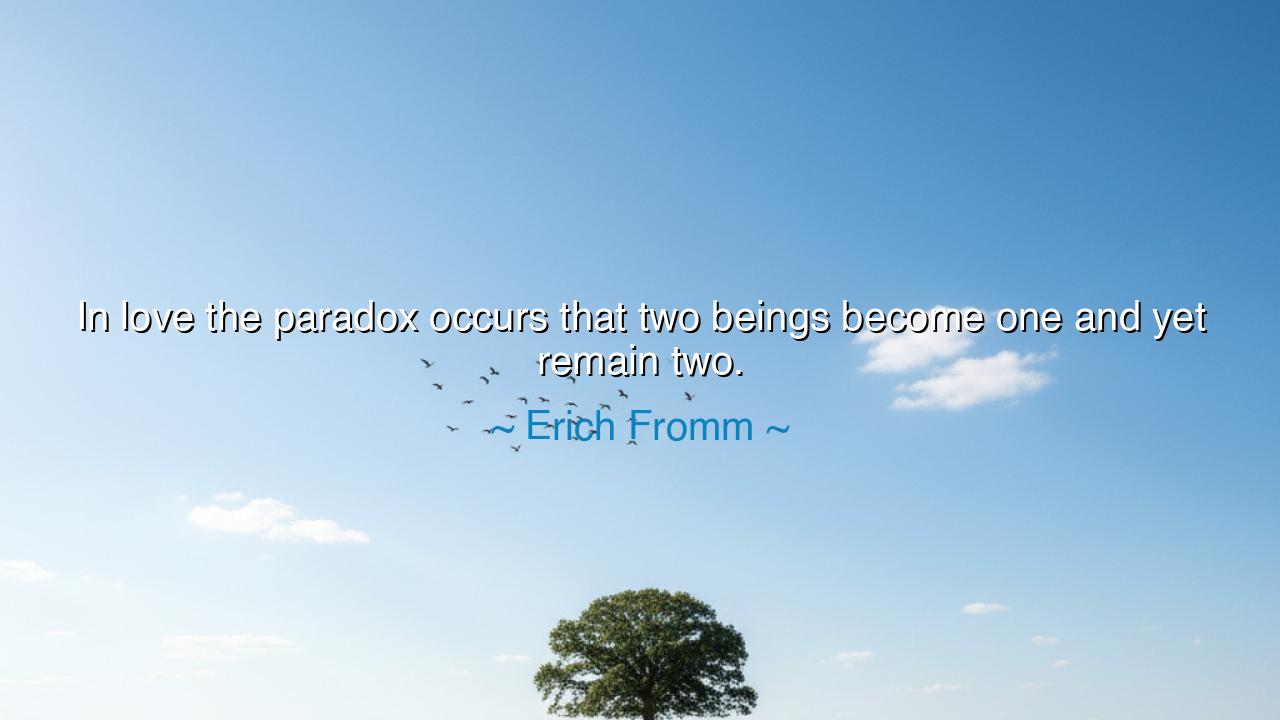
In love the paradox occurs that two beings become one and yet






“In love the paradox occurs that two beings become one and yet remain two.” — Erich Fromm
Thus spoke the wise Erich Fromm, seeker of the deep laws of the heart, teacher of what it means to love as both art and discipline. In his words lies a mystery that echoes through time — a paradox of love, that when two souls meet in true union, they do not dissolve into each other, but instead find a wholeness that honors both. They become one in spirit, yet remain two in essence. The bond does not destroy the self; it refines it, like fire purifying gold.
Fromm, a philosopher of the twentieth century, lived in an age where love was often mistaken for possession or need. But he saw beyond illusion. He knew that the highest form of love is not to own, but to understand; not to consume, but to commune. In his vision, two beings come together not because they are empty, but because they are already full — full of life, of individuality, of spirit — and their union becomes a dance where neither loses step. Love, he said, is an act of freedom.
In the old tales, this truth was known long before words named it. Remember the story of Antony and Cleopatra, the Roman warrior and the Egyptian queen. Their love was fierce as fire and vast as empire. Together they seemed invincible, yet their tragedy came not from love itself, but from the loss of balance — when the self was consumed by the other. True love, Fromm reminds us, does not demand surrender of the soul. It asks instead for communion without captivity — a sacred bridge between two beings who choose, again and again, to meet halfway.
Even in the simplicity of daily life, this paradox reveals itself. Look at an old couple walking hand in hand. Decades have passed, yet in their faces you see both the same soul and two distinct lives — the one who dreams, the other who steadies, the one who speaks, the other who listens. Their togetherness does not erase their individuality; rather, it magnifies it. This is the alchemy of love: that in union, each becomes more themselves than ever before.
But beware, young hearts, for not all that calls itself love holds this wisdom. Many lose themselves in infatuation, mistaking dependence for devotion. When love becomes a cage rather than a wing, it ceases to be love and becomes fear. True love, the love that Fromm speaks of, is a merging of souls without the death of either. It is the meeting of two rivers that flow side by side, their waters mingling but never losing the source from which they spring.
To live this truth, one must first know and love oneself. For how can two become one in harmony if neither knows who they are alone? Only those who stand firm in their own being can share that being freely. Therefore, cultivate your soul, your wisdom, your joy — not for pride, but so that when love comes, you bring not a shadow of yourself, but a radiant whole. Love thrives not in need, but in abundance.
The lesson, then, is both gentle and profound: love deeply, but do not lose yourself in the loving. See the divine spark in the other, and protect the one that burns within you. Be one heart, yet two lights. Let your bond be a garden where both roots intertwine and both flowers bloom.
For when love reaches its highest truth, the paradox is fulfilled — two beings become one and yet remain two. Each soul, complete in itself, finds joy in the other’s freedom. And in that sacred space between them, the eternal dwells — the place where unity and individuality embrace, and love becomes the language of the divine.






AAdministratorAdministrator
Welcome, honored guests. Please leave a comment, we will respond soon